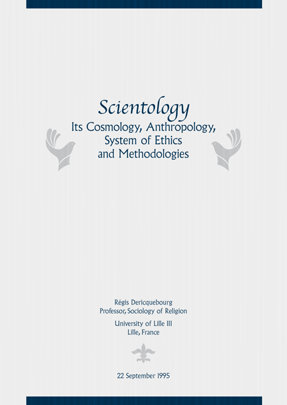
-
HOME
-
WHAT IS STANDOur Mission Our Values Our Help Contact
-
WHAT WE FIGHT FORReligious Freedom Religious Literacy Equality & Human Rights Inclusion & Respect Free Speech Responsible Journalism Corporate Accountability
-
RESOURCESExpert Studies Landmark Decisions White Papers FAQs David Miscavige Religious Freedom Resource Center Freedom of Religion & Human Rights Topic Index Priest-Penitent Privilege Islamophobia
-
HATE MONITORBiased Media Propagandists Hatemongers False Experts Hate Monitor Blog
-
NEWSROOMNews Media Watch Videos Blog
-
TAKE ACTIONCombat Hate & Discrimination Champion Freedom of Religion Demand Accountability

Scientology: Its Cosmology, Anthropology, System of Ethics and Methodologies
BY RÉGIS DERICQUEBOURG, PH.D., PROFESSOR OF SOCIOLOGY OF RELIGION, UNIVERSITY OF LILLE III, FRANCE
Synopsis:
In this article, originally published in 1999, Professor Régis Dericquebourg affirmatively answers the question “Is Scientology a religion?” through a systematic examination of its cosmology, theology, anthropology, system of ethics, ceremonies, organization, creeds and membership requirements: “Scientology,” Dr. Dericquebourg concludes, “has the characteristics of a religion. It has a theology, a set of exercises making it possible to reach the spiritual part in every human being, a ‘very bureaucratized’ church structure, and religious rites. … Scientology is born in a modern context. It gets from it certain elements (technicity, well-asserted methodical approach, importance of communication, well-being, understanding of organization, personal experience) which it has mixed with ancient spiritualistic traditions. L. Ron Hubbard and Scientologists extend the use of instruments of rationality in the service of a mystical path, a self-transformation and a transformation of the world. It is probably for that reason that it appears unique among the religions.” Indeed, Scientology is a religion born in the modern age, offering the mental and spiritual technologies of L. Ron Hubbard for the benefit of its parishioners—in addition to the global social betterment and humanitarian programs sponsored by the Church of Scientology for the benefit of humanity.

